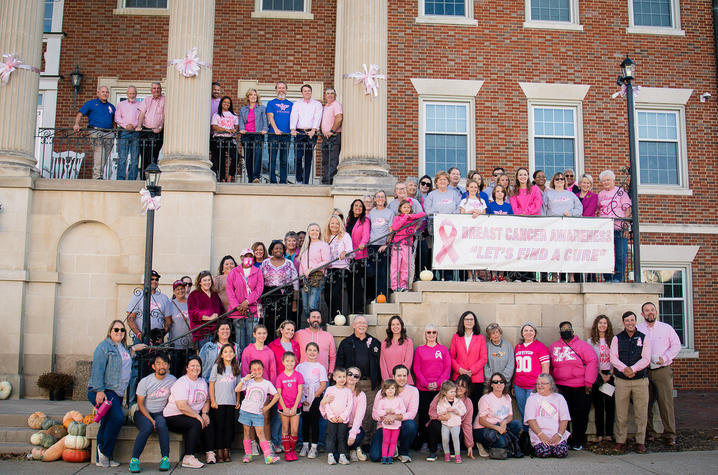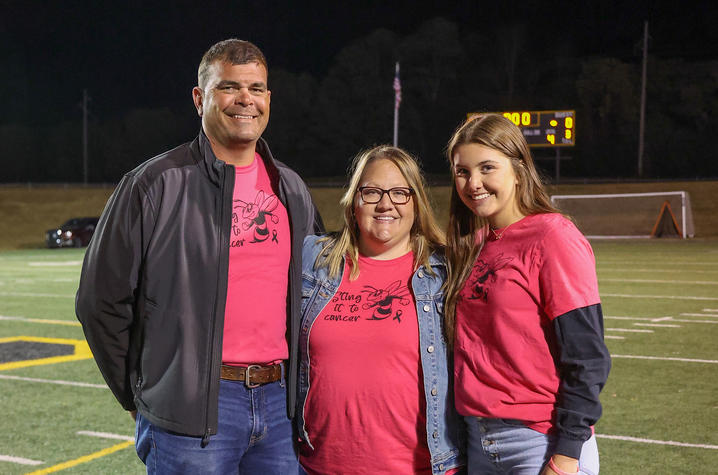Markey patient unites community with the power of pink
LEXINGTON, Ky. (Oct. 18, 2023) — Every October, the city of Versailles, Kentucky, is adorned in pink. Light poles downtown don bright pink banners — each with the photo of someone diagnosed with breast cancer — patients, survivors and those who lost their lives to the disease.
Versailles resident Catherine Anderson and her daughter Peyton came up with the idea in 2021 and raised funds to get them installed with the support of local businesses and the community.
The banners do more than spread awareness. They recognize family members, friends and neighbors and serve as a reminder of how many lives are affected by the disease. For patients, they also serve as a reminder that they have a support system right in Versailles.
As a breast cancer survivor, Catherine knows the power of connection can make all the difference for someone going through treatment.
—-
In 2018, Catherine detected a lump in her breast. Her doctor ordered a mammogram and she got the news soon after — breast cancer. For the busy mom and current college business officer at University of Kentucky’s Graduate School, the diagnosis was unexpected. She was just 36.
From the very first day of her cancer journey, Catherine and her significant other, Josh, made it a priority to keep life as normal as possible — especially for their daughter, Peyton who was then 12 years old.
“It was such an emotional time,” said Catherine. “At first I was uncertain about what the future would hold, but I remember telling Peyton, ‘I'm not going anywhere.’”
“I remember being so scared when I heard the awful news,” said Peyton. “On days when my parents would be gone for appointments, my grandparents and our friends would always make sure I got to where I needed to be so my parents and I didn’t have to worry.”
During Catherine’s first appointment at the UK Markey Cancer Center at Lexington Clinic, her oncologist Rachel Harper, M.D., worked with a multidisciplinary team to develop a plan of care.
Catherine was diagnosed with stage 2 HR+/HER2+ breast cancer, also known as triple-positive breast cancer.
“Triple positive breast cancer is driven by hormones and the HER2 protein,’’ Harper said. “While these features cause cancer to grow, they also offer more targets for treatment, so patients with this subtype can have good results with therapy.”
Her treatment regimen included five months of chemotherapy infusions followed by bilateral mastectomy and breast reconstruction surgery. She also took a targeted therapy called Herceptin for a year and remains on endocrine therapy.
Finding encouragement through connection
After her diagnosis, Catherine noticed how many people in her own community, including many other women under 40, were affected by the disease.
“Of course it was something I was more aware of,” Catherine said. “But now, looking back, I think other people going through the same thing just felt more comfortable sharing their story with me.”
One of the things that helped Catherine the most was connecting with other breast cancer patients and survivors.
She formed a close friendship with another woman from Versailles who was diagnosed around the same time. The two would often get their chemotherapy infusions on the same day and talk for hours.
“If I didn't have her, I probably would have been lost,” she said. “It’s just not the same talking to people who haven't gone through this. The emotions you have when you find out you have cancer ... you feel like you have cooties. And nobody wants to come close to you.”
Catherine also found comfort in her care team, especially Harper.
“As my doctor, she was the one person I could truly believe when she told me everything was going to be OK, and that reassurance was so important,” Catherine said. “When I was done with treatment and visited her less, it felt like we were breaking up.”
Pink Sisters
Once she was cancer-free, Catherine was determined to give back to the community that had supported her so much.
“I think the positive side of that was she had such a sense of community surrounding her going through that fight, so we wanted to create that sense of community for others going through it,” said Peyton.
Catherine and Peyton created Pink Sisters, a nonprofit organization aimed at raising breast cancer awareness and providing resources to those affected. The name represents patients, survivors and the broader community of individuals affected by breast cancer.
“It's not just for the person fighting — and my daughter would attest to this — because it affects everybody,” Catherine said.
Pink Sisters is behind more than the pink banners installed in town each October. Since it became a 501(c)3 in 2021, the group has raised funds to assist patient needs and become a resource to the community.
They also hold several local events where they share information about awareness and early detection, including self-examination — which saved Catherine’s life.
Most importantly, the group offers other patients and survivors the opportunity to connect through social events, a support group and online via their Facebook page.
“I was lucky to have a strong support group to help me through my breast cancer journey, but not everyone does,” Catherine said. “No one should go through it alone.”
UK HealthCare is the hospitals and clinics of the University of Kentucky. But it is so much more. It is more than 10,000 dedicated health care professionals committed to providing advanced subspecialty care for the most critically injured and ill patients from the Commonwealth and beyond. It also is the home of the state’s only National Cancer Institute (NCI)-designated Comprehensive Cancer Center, a Level IV Neonatal Intensive Care Unit that cares for the tiniest and sickest newborns and the region’s only Level 1 trauma center.
As an academic research institution, we are continuously pursuing the next generation of cures, treatments, protocols and policies. Our discoveries have the potential to change what’s medically possible within our lifetimes. Our educators and thought leaders are transforming the health care landscape as our six health professions colleges teach the next generation of doctors, nurses, pharmacists and other health care professionals, spreading the highest standards of care. UK HealthCare is the power of advanced medicine committed to creating a healthier Kentucky, now and for generations to come.






